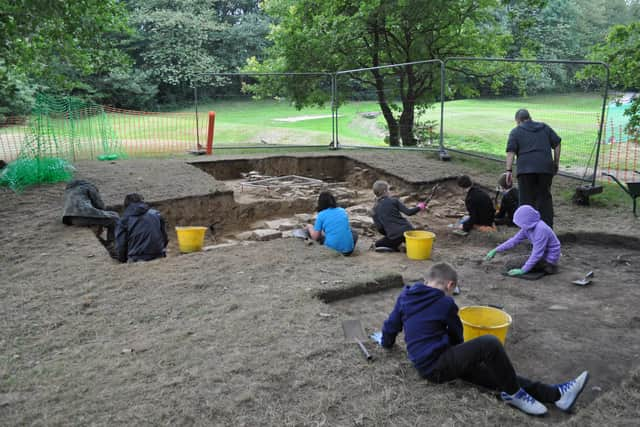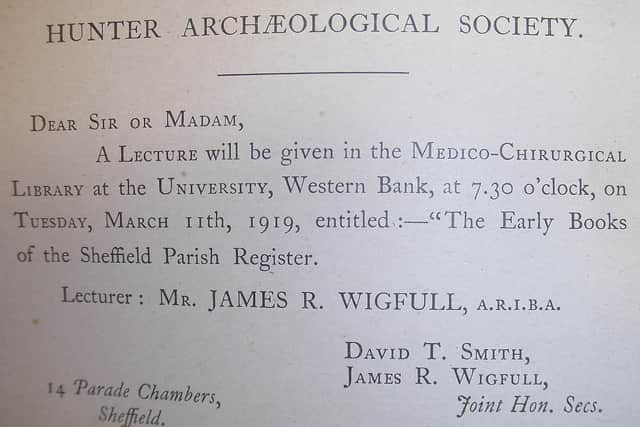Why Sheffield archaeology society is searching for a new home after 109 years
and live on Freeview channel 276
The very first meeting of the society took place in May 1912, in the university’s Medical Library in Western Bank.
One of the founder members of the society was solicitor and antiquarian Thomas Walter Hall, brother of Arthur Hall who was soon to become Professor of Medicine, and recently recognised by a blue plaque on the family home at 40 Victoria Street.
Advertisement
Hide AdAdvertisement
Hide AdIt is likely that Arthur Hall facilitated the use of the library or other venues in the university for the society meetings for many years.


A later move to the lecture theatres under the Arts Tower was followed by several years in the very suitable Humanities Research Institute on Gell Street, until the society was obliged to leave and move to The Diamond in 2017 – the only suitable room the university could offer us.
This was not popular with many members, since people had not forgotten the university’s determination to demolish the listed Edwardian Jessop Hospital wing to build The Diamond, which opened in 2015; this caused great controversy and revealed a side to the university which surprised many people.
Now that the university has decided to close the Department of Archaeology, the society is no longer able in all conscience to put its hard-earned resources into paying for a meeting venue and is researching alternative suitable places to hold its talks.
Advertisement
Hide AdAdvertisement
Hide AdThis is not the only impact on the society – it has always been very closely connected with staff and students in so many ways.


Aside from members’ anger and shock at the approach the university has taken, we are acutely aware that, following a move elsewhere, staff and students are less likely to join us at our talks and social events.
Every year, several of our talks are delivered by staff and postgraduate students about their latest research and projects.
Staff give their time to chair and sit on our committee, invite us to visit their excavations and advise on all manner of queries.
Advertisement
Hide AdAdvertisement
Hide AdThe decision to close the department was made by the University Council on 12 July on the recommendation of the University Executive Board, though it was contrary to all the other recommendations both from within the university (the dominant view of the senate members after a debate on 22 June, and of the present archaeologists and former staff.)
It was also objected to by many national organisations - the British Academy (a letter signed by 43 Fellows of the Academy), the All-Party Parliamentary Archaeology Group, the Society of Antiquaries, the Council for British Archaeology and more, just at a time when the Government is predicting a major shortfall of archaeologists in Britain over the next few years with major projects such as HS2.
One of the justifications for the closure has been the Government’s decision to cut funding by half for arts and humanities courses, which is threatening many subjects nationwide, and affecting other parts of Sheffield University such as languages.
But literally just days after the decision to close the Archaeology Department was made in Sheffield, the Government removed archaeology from the arts and humanities category and gave it a reprieve from the funding cuts.
Advertisement
Hide AdAdvertisement
Hide AdWithin Sheffield and the region, the condemnation of the decision has been especially vociferous as the department has been one of the most closely engaged of any part of the university with local organisations and projects, most recently in the plans for urban regeneration on the site of the medieval Sheffield Castle, and in researching its history.
Its graduates now work in local organisations involved in heritage such as the South Yorkshire Archaeology Service, the Peak District National Park Authority and Creswell Crags, and university staff have carried out major projects at sites such as Manor Lodge and Whirlow Hall Farm in Sheffield.
In addition, the staff give their support willingly to many community groups, by giving talks, advising on applying for grants and doing surveys and geophysics – this month has seen excavations taking place at Beauchief Abbey, looking for the precinct wall and evidence of woodland industry, run by the Archaeology Department staff to give students the experience they need, but open to anyone – including children - to come along and experience the excitement.
If the closure goes ahead, none of this will happen.
Though the vice-chancellor has promised the university will continue its involvement in archaeology, including local engagement, he has not explained how this can be achieved by three or four archaeologists dotted around the university instead of the dozen or more in one department, or how the university will manage to attract students when they can go to universities with proper archaeology departments.
Advertisement
Hide AdAdvertisement
Hide AdSheffield University archaeologists are still fighting to get the decision reversed, and the University should accept it has made the wrong choice.
If the campaign doesn’t succeed, expect to see less and less professional support and involvement in Sheffield’s heritage, just when we need it most.